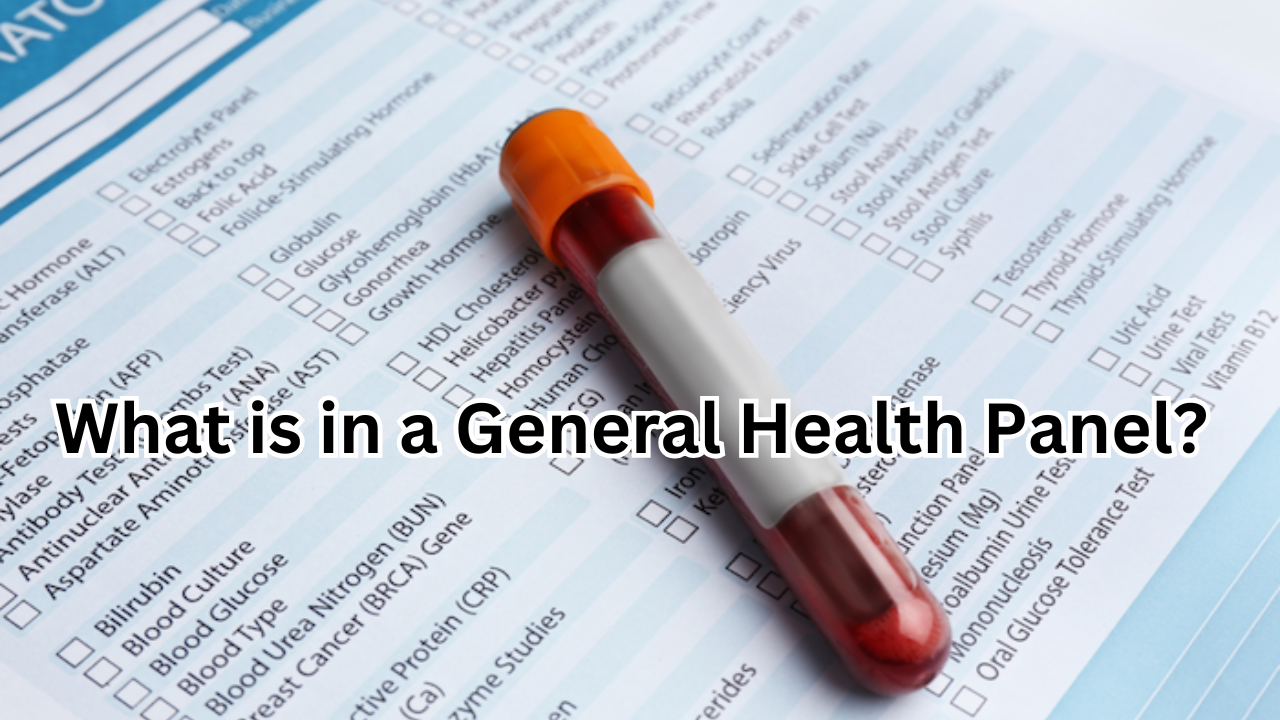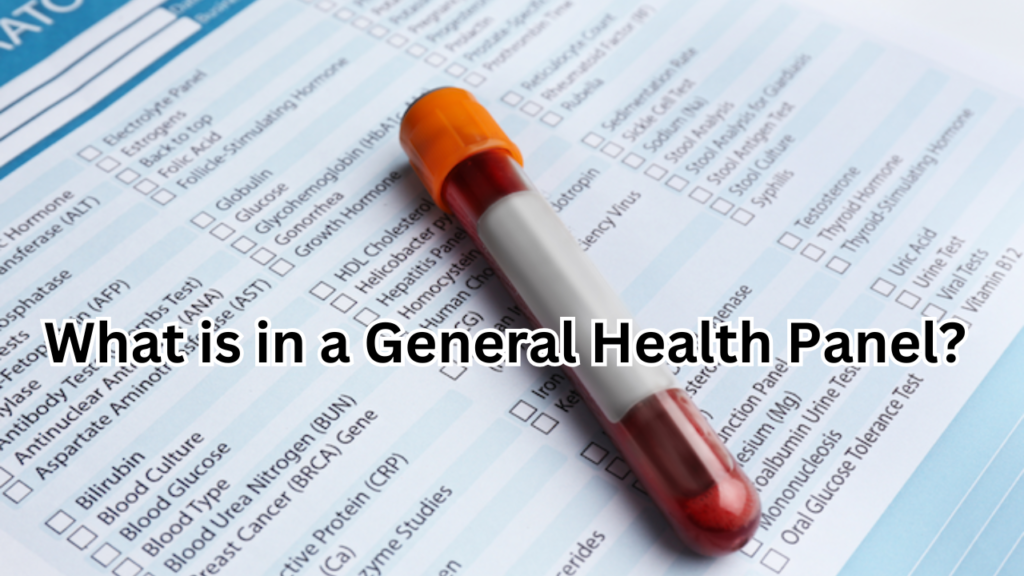What is in a General Health Panel?
Uncover what is in a General Health Panel entails, from vital tests to their importance in maintaining your health. Get informed about your health today.


Table of Contents
Introduction
A general health panel is a comprehensive set of blood tests designed to assess various aspects of your overall health. By analyzing key markers in the blood, these tests provide valuable insights into how well your organs are functioning and whether there are any underlying health issues. So, what is in a general health panel? Typically, it includes tests for cholesterol levels, blood sugar, liver function, kidney function, and other vital indicators that help detect early signs of conditions such as diabetes, heart disease, and liver disorders.
Routine blood tests like a general health panel are essential for maintaining good health. They can identify potential health problems before symptoms appear, allowing for early intervention and better outcomes. Preventive healthcare is all about taking proactive steps to ensure long-term well-being, and a general health panel plays a crucial role in this approach. By scheduling regular blood tests, you can stay ahead of potential health risks and make informed decisions about your lifestyle and treatment options.
Understanding a General Health Panel
A general health panel blood test is a comprehensive blood screening designed to provide an overview of your overall health. This test typically includes a series of measurements related to critical bodily functions, such as heart health, kidney function, liver health, and blood sugar levels. By analyzing various components in the blood, a general health panel helps doctors detect early signs of medical conditions like diabetes, high cholesterol, and liver disease, even before symptoms develop.
The purpose of a general health panel blood test is not only to identify potential health issues but also to monitor the effectiveness of treatments for existing conditions. This proactive approach allows healthcare providers to make adjustments to treatment plans, ensuring better outcomes. For medical professionals and insurance companies, the general health panel CPT code is used for billing and coding purposes to identify this specific set of tests. Understanding what’s included in the panel and its role in preventive healthcare can help you make informed decisions about your well-being and overall health management.
Components of a General Health Panel
A general health panel includes a variety of tests that provide important insights into your overall health. These tests help healthcare providers assess key aspects of your bodily functions and detect potential health issues. While the specific tests may vary slightly between different labs, such as General health panel Labcorp or General Health Panel Quest, most panels contain the following common components:
Complete Blood Count (CBC)
The CBC is a basic test that measures several components of your blood, including red blood cells, white blood cells, platelets, and hemoglobin. It helps identify conditions like anemia, infections, and blood disorders. By analyzing these components, doctors can gain insight into your immune system and overall health status.
Comprehensive Metabolic Panel (CMP)
The CMP measures glucose levels, kidney function, liver enzymes, and electrolyte balance. It provides valuable information about your body’s chemical balance and metabolic processes. This test can help detect conditions such as diabetes, kidney disease, liver disease, and issues with bone health.
Lipid Panel
A lipid panel assesses cholesterol levels, including total cholesterol, HDL (good cholesterol), LDL (bad cholesterol), and triglycerides. Monitoring these levels is crucial for evaluating heart health and assessing your risk of cardiovascular diseases such as heart attack or stroke.
Other Tests
Additional tests included in a general health panel may vary depending on the laboratory conducting the test. For example, General health panel Labcorp may include tests for vitamin D levels, thyroid function, or specific markers related to inflammation. General Health Panel Quest might offer additional screening for conditions like liver function or electrolyte imbalances. Both labs provide a wide range of tests, ensuring that your health is thoroughly evaluated.
These tests form a comprehensive picture of your health and fitness help doctors detect potential issues early, allowing for timely intervention and better management of your well-being.
How General Health Panels Differ by Provider
While the core components of a general health panel remain largely consistent, there can be notable variations between providers, such as Labcorp and Quest Diagnostics. Each lab may offer slightly different tests, panels, and specialized screenings based on their capabilities and services. These differences are important to consider when scheduling your blood tests, as they may affect the results and the depth of the health assessment provided.
For example, General health panel 80050 is a commonly used code that refers to a specific set of tests, typically included in most standard general health panels. However, the exact components of this panel may differ slightly depending on the lab conducting the test. At Labcorp, this panel might include additional markers for liver function or tests for specific diseases, while Quest Diagnostics might offer a slightly different array of tests, such as a more detailed lipid profile or thyroid screening.
Both providers use the general health panel CPT code to standardize billing and coding for the tests performed. This code ensures that the same set of tests is identified across different healthcare systems, making it easier for healthcare providers and insurance companies to process claims. While the core tests remain similar, it’s essential to consult with the lab beforehand to understand the specific tests included in your panel and whether any additional screenings might be necessary for your individual health needs.
Understanding how general health panels differ between providers allows you to choose the right lab for your health needs, ensuring that you receive the most comprehensive and accurate results.
Insurance Coverage for General Health Panels
General health panels are often an essential part of routine health check-ups, but coverage for these tests can vary depending on your insurance plan. In many cases, general health panels are covered by insurance when they are deemed medically necessary. For instance, if your doctor orders the panel as part of a preventive care exam or to monitor existing health conditions, your insurance may cover the costs. This is especially true if the tests are included under wellness benefits or preventive care provisions, which are often covered under the Affordable Care Act (ACA) for adults.
However, there are instances where a general health panel is not covered by insurance. This can occur when the tests are ordered for reasons not related to a documented medical need or if they are considered routine screenings that aren’t deemed necessary for your specific health profile. For example, if you request a general health panel without a doctor’s recommendation, or if your insurance plan has restrictions on certain tests, the panel may not be covered. Additionally, some insurance plans may have limits on the number of preventive tests covered per year or may exclude coverage for tests that are not part of the standard preventive care offerings.
It’s important to check with your insurance provider ahead of time to understand whether a general health panel is covered by your plan, and if there are any specific requirements or limitations that apply. This can help you avoid unexpected out-of-pocket costs and ensure you get the necessary tests covered under your insurance benefits.
Is a General Health Panel Considered Preventive Care?
The question of is a general health panel considered preventive care can vary depending on the specifics of your insurance policy and the reason for the test. Generally, preventive care refers to services that help detect or prevent serious health conditions before symptoms appear, such as routine screenings and wellness exams. Many insurance plans, especially those compliant with the Affordable Care Act (ACA), cover certain preventive services at no additional cost when they are deemed medically necessary by a healthcare provider.
In most cases, a general health panel is considered preventive care when it is ordered as part of a routine check-up or wellness exam. These panels typically include tests that assess overall health, such as cholesterol levels, kidney function, and blood sugar, which help detect early signs of conditions like heart disease, diabetes, or kidney problems. As such, general health panels are often covered as preventive care under many insurance plans, provided they are performed during an annual physical exam or other approved preventive visit.
However, is a general health panel considered preventive care can depend on the specific insurance policy. Some plans may require certain conditions, such as age or risk factors, before covering the cost of a general health panel as part of preventive care. If the panel is ordered outside of a preventive visit or if it is requested without a doctor’s recommendation, it may not qualify for coverage under preventive care benefits. It’s always advisable to verify with your insurance provider to understand what is covered under your plan and whether a general health panel falls under preventive care.
Benefits of Regular General Health Panels
Regular general health panels offer a wide range of benefits, from early detection of health issues to monitoring chronic conditions and assessing overall well-being. By routinely checking key health markers, you can gain valuable insights into your body’s functioning and catch potential problems before they become serious.
One of the primary benefits of a general health panel is the early detection of health issues. These panels assess various factors such as cholesterol levels, kidney function, and blood sugar, which can reveal the presence of conditions like diabetes, heart disease, or liver dysfunction. Detecting these issues early allows for timely intervention, which can prevent the development of more severe complications and improve overall outcomes. By understanding what is in a general health panel, you can better appreciate the important role these tests play in identifying health concerns that might otherwise go unnoticed.
Another significant advantage of regular general health panels is monitoring chronic conditions. If you have an ongoing health issue such as hypertension, diabetes, or high cholesterol, a general health panel can help you track your condition and assess the effectiveness of any treatments or lifestyle changes. Regular tests provide your healthcare provider with up-to-date information, allowing for adjustments to your treatment plan to ensure optimal management of your health.
Lastly, general health panels are an excellent tool for assessing overall well-being. By evaluating a variety of health markers, these panels offer a comprehensive snapshot of your health, giving you a clear picture of how your body is functioning. This holistic assessment helps you understand where you stand and empowers you to take steps toward improving your health, whether that’s through diet, exercise, or other lifestyle changes. Regular check-ups using a general health panel ensure that you stay proactive about your health and well-being.
Conclusion
In conclusion, a general health panel is a valuable tool for maintaining and monitoring your overall health. By regularly assessing important health markers, these panels help detect potential issues early, manage chronic conditions, and provide a comprehensive overview of your well-being. Understanding what is in a general health panel empowers you to make informed decisions about your health and stay proactive in preventing serious medical conditions.
It’s important to consult with your healthcare provider to determine the appropriate time for routine health checks. Regular general health panels are essential for everyone, especially those looking to stay ahead of potential health risks. Don’t wait for symptoms to appear—schedule a general health panel today and take the first step toward proactive health management. Your future self will thank you!
FAQs about General Health Panels
What does the general health panel include?
A general health panel typically includes a range of tests that assess key aspects of your overall health, such as blood sugar levels, cholesterol, liver function, kidney function, and more. These tests help detect early signs of conditions like diabetes, heart disease, and kidney problems. Understanding what is in a general health panel gives you a clearer picture of the health markers monitored during these screenings.
What is included in the General Health Panel Quest?
The General Health Panel Quest often includes a comprehensive set of tests similar to those offered by other providers. Common tests in this panel include a Complete Blood Count (CBC), Comprehensive Metabolic Panel (CMP), Lipid Panel, and other vital markers. Quest may also include additional screenings like thyroid function or vitamin levels, depending on your specific needs and healthcare provider recommendations.
What does a full panel test include?
A full panel test generally includes a broad range of health assessments, including a CBC, CMP, Lipid Panel, and other tests that check for conditions such as diabetes, kidney disease, liver disease, and cholesterol imbalances. The exact tests included can vary by provider, but a full panel typically provides a comprehensive overview of your health.
What does a general health blood test check for?
A general health blood test checks various components of your blood, including glucose, cholesterol, liver and kidney enzymes, and electrolytes. These tests help evaluate how well your organs are functioning and can detect early signs of potential health problems, such as high cholesterol, kidney dysfunction, or liver disease.
How often should you take a general health panel test?
How often you should take a general health panel test depends on your age, medical history, and risk factors. Generally, it’s recommended to have a general health panel annually or as advised by your healthcare provider. If you have certain health conditions, such as diabetes or high blood pressure, more frequent testing may be necessary to monitor your condition.
Are fasting requirements necessary for a general health panel?
Fasting requirements for a general health panel can vary depending on the specific tests being performed. For example, a lipid panel, which measures cholesterol levels, often requires fasting for 9-12 hours before the test. It’s important to follow your healthcare provider’s instructions regarding fasting to ensure accurate test results.
How long do general health panel results take?
Results from a general health panel typically take a few days to process, but the timeline can vary depending on the lab. Most providers, like Quest Diagnostics or Labcorp, will have your results ready within 1 to 3 business days. Your healthcare provider will contact you to discuss the results and any next steps, if necessary.
What should you do if abnormal results are found?
If abnormal results are found in a general health panel, it’s essential to follow up with your healthcare provider. They will interpret the results, discuss any potential concerns, and determine whether further testing or treatment is needed. Early detection of health issues allows for prompt intervention and better management of your health.







